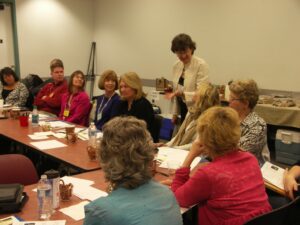Introduction to the Toolbox
Welcome to what’s affectionately called the Toolbox.
What is it? Over a period of five years, we invented and implemented various processes to deliver the message and practices of coaching conversations.
Our pilot program began with the intention of creating 1:1 (one-on-one) coaching relationships of a Volunteer Success Coach with a Teen. We did exactly that, continuing to invent and innovate as we learned.
The Volunteers page relates the processes and documents to recruit, train, and support our wonderfully dedicated and competent volunteers who beautifully coached teens.
The Teens page then shares the insights, steps, and processes to recruit teens to the program at an inner-city high school.
Once we realized the success of the 1:1 coaching approach, we wanted to reach more teens and allow them greater flexibility in their commitments if they desired to be coached. That led to the development of the Just-in-Time Coaching Office found on the Coaching Office page.
All of the coaching we were doing suggested that, for teens to be better prepared for coaching conversations, having increased self-awareness would serve them. So we created a curriculum that was delivered to a cadre of students. This curriculum generated opportunities for discovery and becoming better observers of who they are. The Building Self-Awareness page shares this information.
 To share and spread the Vision and Mission of Touch Point Connection we provided Community Workshops for youth-serving agencies, schools, and parents. With the use of slide presentations, videos of our teens and volunteers, and engaging learning exercises, participants witnessed and practiced the art of coaching conversations. The Community Workshops page contains this information.
To share and spread the Vision and Mission of Touch Point Connection we provided Community Workshops for youth-serving agencies, schools, and parents. With the use of slide presentations, videos of our teens and volunteers, and engaging learning exercises, participants witnessed and practiced the art of coaching conversations. The Community Workshops page contains this information.
Throughout the five years, we collected information both qualitatively and quantitatively to assess the effects of our work. We collected feedback from initial interviews with teens, status interviews, and exit interviews as needed. Focus groups were conducted at the end of the year. Working with the school district, we accumulated data to monitor our progress. Please refer to the Results/Data page found under Conclusions.
We hope you will find useful a brief summary of our experiences and learning. This can be found on the Reflections page found under Conclusions.
Aside from the documents found on the pages above, we’ve shared several documents we created during our pilot program. Please refer to the News, Reports & Documents page to download these documents found under Conclusions.
Before You Begin
In general, successful coaching relationships begin with a strong foundation, commitments, and agreements.
In the case of coaching under-age youth e.g., under the age of 18 years, we strongly encourage the following:
- It is crucial that the coaching agreement; whether between you and an agency, school, or a parent — is explicitly clear as to the expectations, limitations, and lines of communication during the coaching relationship.
- In case of serious problems, all parties are aware of the Mandatory Reporting and Duty to Warn standards that exist — your responsibility as a coach to uphold those standards — and how you are going to work in conjunction with the appropriate parties in the case of a reportable event.
Thank you for your interest and desire to help youth thrive!


